A niche website focuses on a narrow topic or set of interests that appeals to a relatively small group. You can create a money-making niche website by targeting a tight set of keywords that appeal to a specific audience. Even first-time entrepreneurs can build a niche site on a shoestring budget in seven simple steps.
You have several options for building your niche website. For example, you can launch a WordPress site hosted by DreamHost for as little as $2.59 per month. DreamHost accounts include a free domain, unlimited traffic, a free SSL certificate, themes, and access to powerful plugins. You can add a custom email address for $1.67 per month. Visit DreamHost today.
Here’s how to start building your niche site in just seven steps:
1. Select a Money-making Niche
It’s important that you take great care to select a niche that aligns with your unique needs, personality, and skill sets. To do this, you’ll want to consider the types of things that you’re most drawn to or where you’ve seen the most success in your life.
Consider each of the following:
- Interests: Take a good long look at those things you’ve always been interested in, including websites you visit frequently.
- Passions: These are things that you are wildly excited about. They could be hobbies, causes, values, or professional pursuits that you hold dear.
- Expertise: Write down what you already know how to do well. These highly developed skills could come from either your professional or personal experiences.
Make extensive lists elaborating on all three of these categories. Take note of where your interests, skills, and expertise overlap. Your answers will come in handy when you begin your keyword research.
Explore Market Profitability Potential
You want to pursue a niche that has true profitability potential. That’s why it’s important that you do thorough research before selecting your niche.
Two essential phases of the niche selection process are keyword research and competitive research. The findings that are revealed at this juncture will have a profound impact on whether your website can be profitable.
Keyword Research
Keywords are single words or phrases that people type into search engines to find what they’re looking for. Keyword research is the act of studying those keywords to understand how often people search for various keywords, as well as how much competition exists for those keywords.
Long-tail keywords are phrases with three or more words in them. Long-tail keywords are often used in niche audience targeting because they typically have lower competition than shorter keywords.
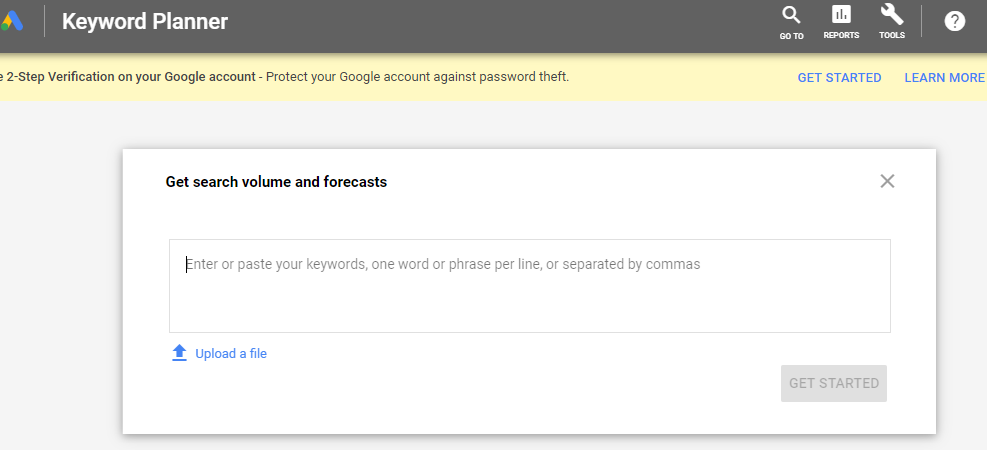
Google’s Keyword Planner is an excellent free keyword research tool.
Google Keyword Planner, offered through Google AdWords, is an easy-to-use, free keyword research tool that helps you view average monthly searches and the degree of competition for any keyword. It also offers suggestions for related keywords that you might be interested in pursuing. Other popular free keyword research tools include Google Trends, Answer the Public, and Ubersuggest.

Answer the Public is a popular free keyword research tool.
If you’re looking for a more robust keyword research tool that offers advanced features, SEMrush, Ahrefs, and KWFinder are all popular options. Paid keyword research tools start at around $29 per month and can scale up into the hundreds.
Competitive Research
You need to identify who your top potential competitors are for the niche or niches you’re considering. When you visit potential competitor sites, look for opportunities. Explore things others are doing poorly that you could do better. Search for essential content or products that your competition is missing.
Competition for your specific subject is not a bad thing; existing competition proves your niche idea is viable. To compete successfully in the niche, though, you’ll need to come up with ways to make your specialty website better than those that already exist.
Other ways to evaluate market interest for your niche include visiting related online forums and message boards and researching related social media postings and groups. You can also sign up for a free Google AdWords account and review Google paid ad history for the keywords you’re considering. The presence of paid ads indicates the niche is profitable for someone.
Decide How You Plan to Make Money
If you want to build a profitable niche website, you need to decide what you are going to sell to achieve the financial success you desire. There are many ways to monetize your site.
The most popular ways to make money online include:
- Affiliate marketing: Affiliate marketing is where you promote the services or products of others on your website and receive a payment when your site visitors take a certain action, such as making a purchase or signing up for a service.
- Sell physical or digital products: You can sell physical or digital products on your specialty website. These can be your own product, private-labeled products, or third-party products.
- Sell services: There are many successful niche websites that focus on selling services. Coaching, home repair, legal, virtual assistant, accounting, dog sitting, graphic design, and landscaping design are just a few examples of the diverse services you can promote on your niche website.
- Advertising: Advertising networks typically pay on a pay-per-click (PPC) or pay-per-action (PPA) model. The most popular advertising network to join for those just starting out is Google AdSense. You can also sell ads on your blogs directly to advertisers.
- Sponsored posts: Sponsored ads or paid reviews is another way to make money on your site. The amount of traffic your site generates and niche alignment are key factors that will determine whether you can land lucrative sponsorship deals.
- Membership sites and members-only areas on your site: A membership site is a website where visitors must purchase a pass to access site content. Some specialty websites offer “members only” areas on their sites, where select content is available exclusively to members who pay an access fee.
- Online courses: Developing and delivering online courses is a rapidly expanding monetization strategy for niche website entrepreneurs. The informational products business is a booming—a billion dollar-plus business—and online courses are exploding in popularity and profitability.
“Building and offering online courses (both free and paid) is the most efficient way to establish your authority around a subject in front of your audience. Especially if you offer training on the narrowest of niche topics.
“If you can solve one problem for your audience with their first course, you have a customer for life. Having mini-online courses on a variety or related topics has become a consistent lead generator for my business.”
– Kenny Jahng, CEO, Big Click Syndicate
How Much You’ll Spend on Your Niche Website
Costs for launching and running a specialty website vary greatly. In your first year, expect costs to be as low as $31 if you’re doing most of the design and development yourself, to upwards of $16,000 or more if you procure outside resources for site development.
First-year Costs for a Niche Site
|
|
|
|---|---|
| Keyword Research Tools |
|
| Purchase Domain Name |
|
| Platform Plus Hosting |
|
| Website Themes |
|
| Website Design Services |
|
| Image Editing Software |
|
| Image Procurement |
|
| Email Marketing Services |
|
| Total First-year Costs |
|
2. Purchase Your Domain
One of the most important decisions you’ll make in launching a niche website is selecting your domain. You want a name that reflects what your niche is about and that is easy for site visitors to remember.
A few things you’ll want to keep in mind when selecting your niche website domain include:
- Make it easy to remember.
- Consider targeting your audience or niche in the name.
- If appropriate, consider a geographic designation in your domain if it’s appropriate for your niche.
- Choose a domain that’s available on the social media channels you plan to use.
- Don’t make your domain too long (10 to 20 characters is the perfect range).
- Don’t use a trademarked phrase.
Your website domain is the primary way people find your site. You’ll place this domain everywhere your site is mentioned, so take care to select a domain that you’ll feel comfortable using in your business for years to come.
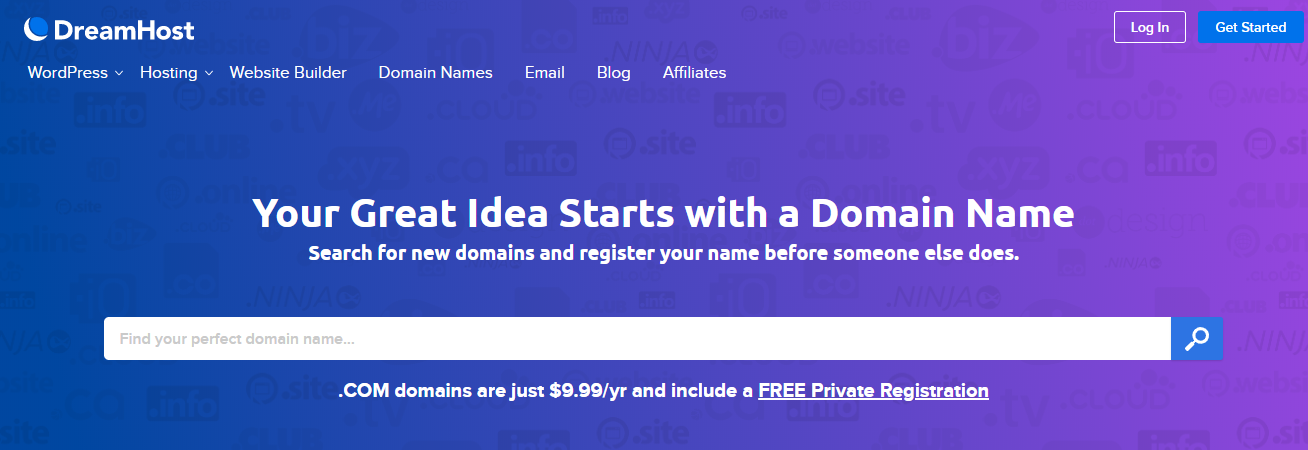
You can purchase your domain from a number of providers, including DreamHost.
3. Choose a Website Platform & Hosting Provider
Choosing a website platform and a hosting provider is an important step in creating a niche website that’s easy to maintain and manage. Today, there are so many amazing options available to users of all technical skill levels.
Top Platform & Hosting Considerations
There are a handful of things that you need to consider when selecting a specialty website platform and site host. This is an important decision and it pays to take your time and do your research before committing to a solution provider.
Top considerations include the following:
- Fast: Speedy site load times are imperative to achieving high page rankings on Google. Some providers excel in site speed while others don’t.
- Secure: You want to minimize the odds that your niche website will be attacked by malware and other cybersecurity threats. That’s why it’s important to choose a hosting provider that takes security seriously.
- Mobile-friendly: Mobile devices generate 48% to 52% of the total global website traffic in 2019, and that number is growing exponentially. Your niche website needs to be built with a responsive design to accommodate traffic from any device.
- Reliable: You can’t make money if your website is always down. Make sure your hosting provider has an excellent track record of uptime stability.
- Scalable: You want your website to be able to grow with you as your website content expands and your audience grows. Make sure you choose a hosting provider and platform that can do that.
- Excellent customer service: This is where many hosting providers fall short. Take great care in choosing a hosting service that provides the level of support you need.
- Ease of use: What’s easy for you may be terribly hard for someone else. It’s important to choose a hosting provider and website platform that you’re comfortable with. Don’t be deceived; many will tell you that it’s easy to build any kind of website, and that might not be true for you. If you’re a beginner and you have limited technical skills, choose a website platform that is targeted for beginners.
Once you’ve considered what you need most from your website platform and hosting provider, your next step is to see which options on the market are right for you. Your best bet is to find a provider that offers the options you need for your niche site at a price you can afford, while also delivering the level of support you require.
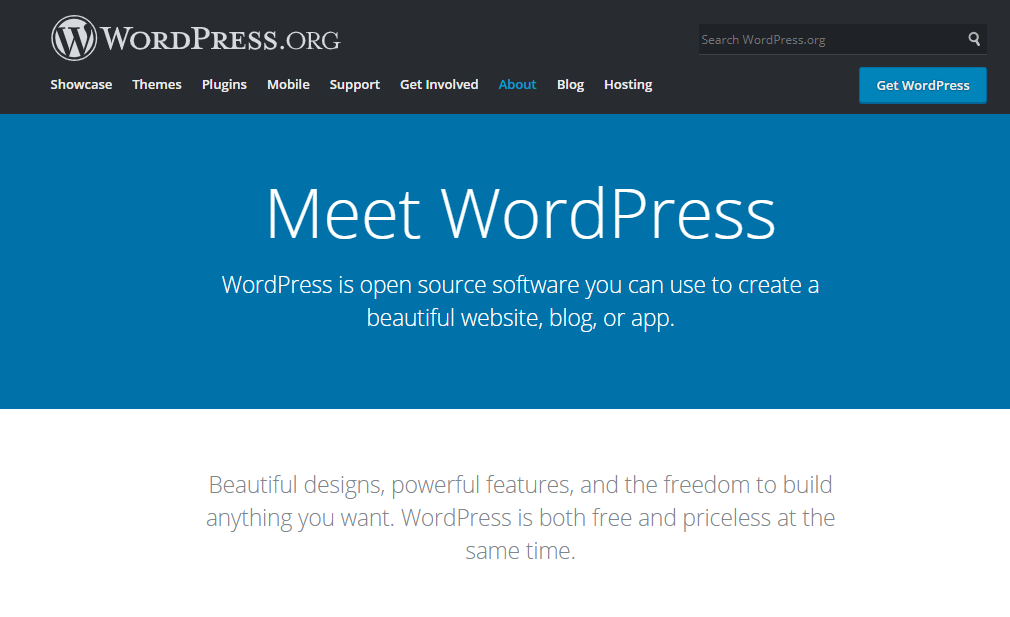
If you choose the popular WordPress.org for themes and building your niche site, you’ll also need a hosting provider.
Popular Platform & Hosting Options
There are dozens of popular website platforms and hosting options to choose from, and more are coming to the market every year. It’s easy to get confused, which is why we’ve identified some specific options for people new to building specialty websites.
Here are four simple-to-use solutions that are popular:
- WordPress platform plus DreamHost hosting provider: A self-hosted WordPress site is the most popular choice for many niche website owners. WordPress is fully supported by thousands of theme and plugin creators who offer services that make it easy to customize your site.
When you choose WordPress as your platform, you’ll also need to sign up for a hosting provider. DreamHost is a full-service hosting provider that costs just $2.59 per month. - Squarespace: This is an all-in-one platform that comes with standard designs that are suitable for a wide variety of niche sites. Squarespace is known for having beautiful website templates and for its easy-to-use site-building tools. Plans range from $12 to $40 per month.
- Wix: Wix is a full-service web design and hosting program that is ideal for beginners with limited-to-no technical skills. Plans range from $17 to $39 per month.
- BigCommerce: BigCommerce is a platform that is perfect for specialty websites that feature online stores. With BigCommerce, you can design your store, accept payments, ship and fulfill orders, and more. BigCommerce offers a free 15-day trial. Plans range from $29.95 to $249.95 per month.
Take time to find a solution that meets your needs and fits your budget. You’ll be in good shape if you keep the concepts we’ve discussed here in mind.
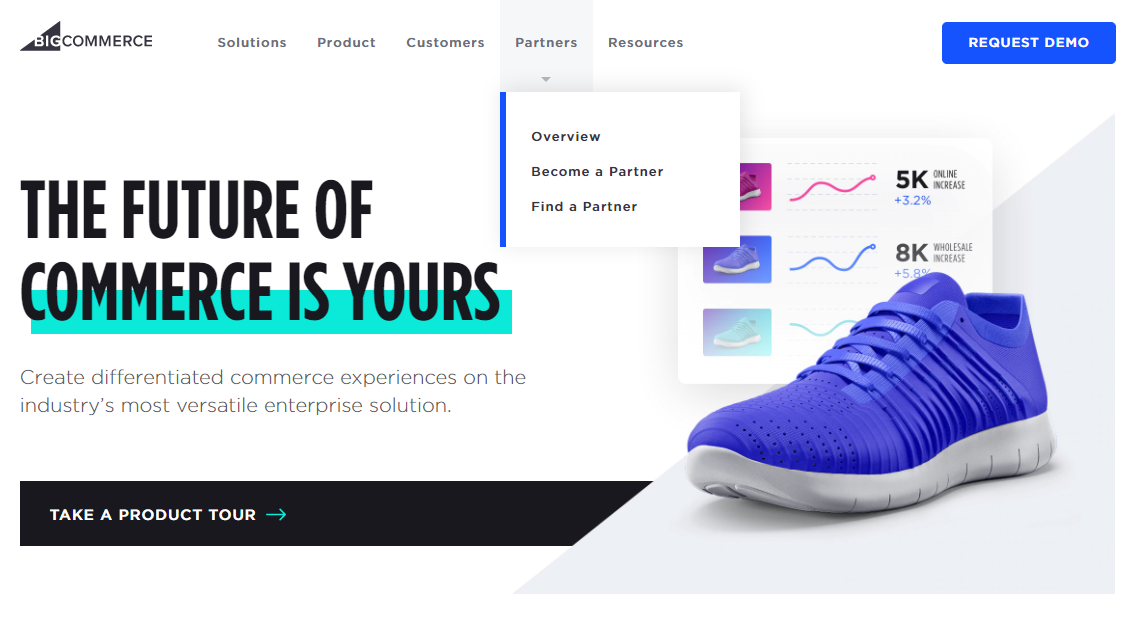
BigCommerce is a platform that allows you to create an online store.
4. Design Your Site
The choice to design your niche website yourself versus hiring a designer often comes down to your design abilities and your startup budget. Hosting platforms like Squarespace take a lot of the design work out of the equation, so you can develop a beautiful site on your own, even if you possess no design talent.
If your budget allows, working with a web design professional is a smart choice for ensuring you have a functional and attractive website from day one. Fiverr is a popular solution for those looking for affordable design help. Fiverr gives you access to hundreds of designers from around the globe. Designer skill levels on Fiverr run from basic to expert.
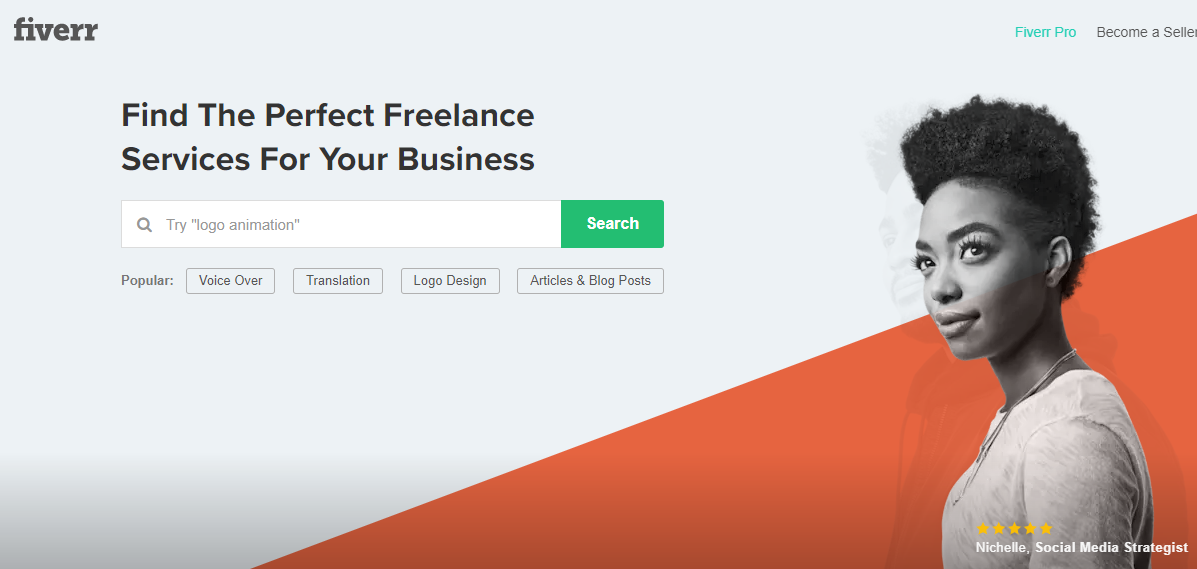
Popular Design Resources
Every site needs compelling imagery to convey the website’s key messages. Strong images help you convert more customers.
Here are a few image procurement and image editing options to consider:
- Images: Pixabay, Pexels, and Unsplash are all popular sites for free images. If you’re looking for more variety or higher quality photos, Getty Images and 123rf.com are excellent sources for royalty-free images. Photos, videos, and illustrations on these sites typically range from $1 to $250, depending whether you’re buying a standard or extended-use license.
- Image editing software: Canva and PicMonkey are two popular image editing software programs that allow you to resize images, add text, add filters, and more. Both offer free, as well as paid, programs. If your technical skills are strong, Photoshop is an excellent photo editor that might work best for you.
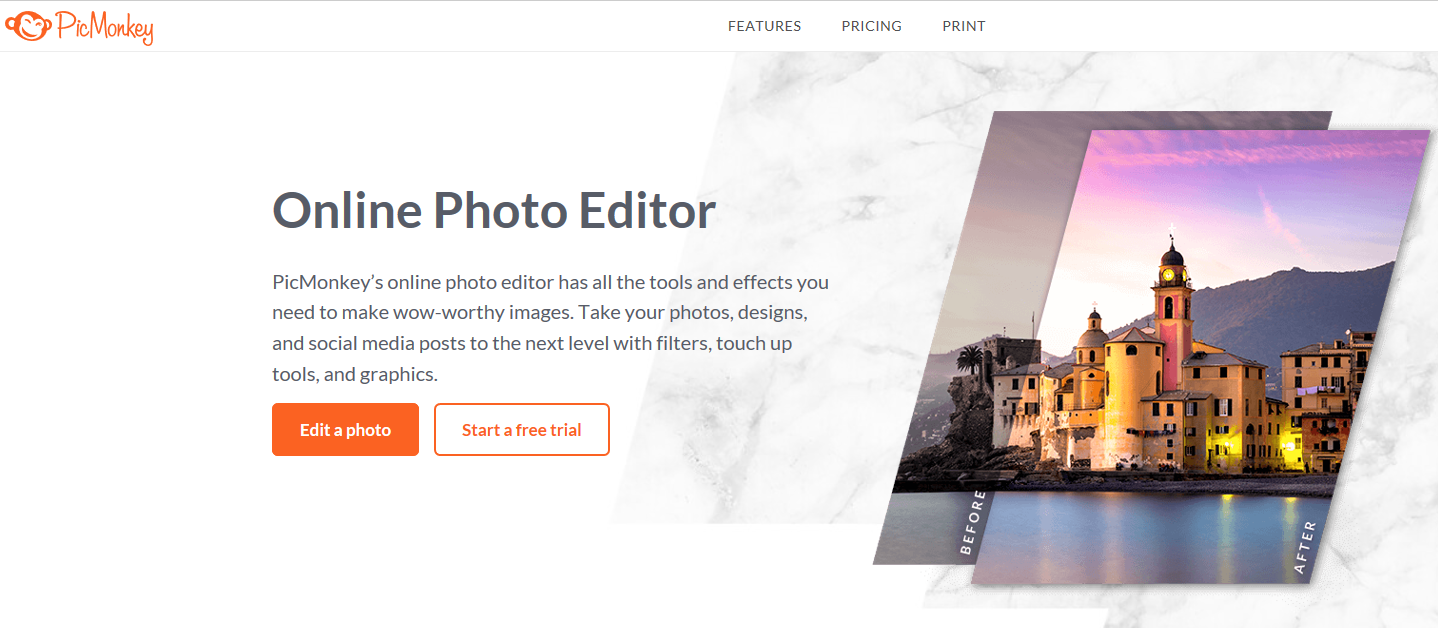
PicMonkey is a popular and easy-to-use image editing tool.
Always make sure that you understand image use rights before adding an image or video to your site. Using images with rights protected could cost you thousands in legal fees and court case settlements.
5. Set Up Payment Processing
If you plan to sell products or services on your niche site, you’ll need a way for customers to pay for their purchases. Payment processors take the headaches out of accepting payments and sending invoices.
Popular payment processing vendors include:
- Payment Depot: Payment Depot plans range from $49 to $199 per month, with transaction fees ranging from 5 cents to 15 cents per action. Payment Depot also has a generous two-month free trial program when you contact them directly.
- Square: Square credit card processing lets you accept all types of payments everywhere you sell, including online and offline. Square’s ecommerce fees are 2.9% of the total transaction plus 30 cents per transaction.
- PayPal: Perhaps the most well-known of all payment processing options, PayPal fees are 2.9% of the total transaction plus a fixed fee amount based on the currency used.
Every website needs a reliable and secure way to take payments online. Luckily, with the help of these payment processing gateways, you can start accepting payments online quickly and easily.

Payment Depot is a popular processing option for taking payments online.
6. Create Website Content That Converts
For your website to be successful, you need to create content that focuses on your site visitors’ wants, needs, and interests. You also need content that converts into sales.
Three of the most important things you can do to ensure your website makes money is to focus on the following:
- Credible content: Your integrity is on the line with every piece of content you add to your site. Making outrageous claims, including incorrect information, or flat-out lying to site visitors will do irreparable harm to your reputation. Citing trusted sources, including clear, straightforward directions, and going the extra mile to be transparent in all you include on your site will reap rewards for years to come. Highly credible sites always make more money.
- Engaging content: If your readers aren’t engaged, they’ll leave. If site visitors leave too soon, you have no chance of making a sale either today or any day, as people who abandon your site quickly seldom return. Visitors who spend lots of time on your site and click through many pages can become fans for life.
- Strong calls to action (CTAs): Make sure your website is rich with clear CTAs so your visitors aren’t confused about how to work with you or buy something from your site. Clear and compelling CTAs can improve the profitability of your website tenfold.
Credible, engaging sites that use effective CTAs make visitors feel welcome. If you get these three content keys right, you’re well on your way to website profitability.
Most Popular Types of Content
Sites that employ a variety of content types tend to work better than those that stick with just one format. There are so many different types of content you can include on your niche website, including list posts, interviews, reviews, infographics, comparison posts, case studies, and how-to posts. Experiment to see which types of posts your niche audience likes the best.
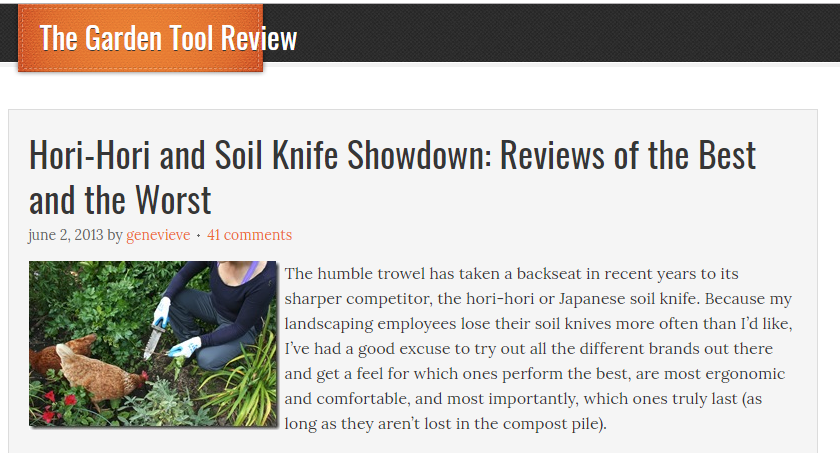
Example of a review-style post.
7. Drive Traffic to Your Niche Website
You want to get people to find you online, but not just any people: You want those who are most interested in what you have to offer to find you online. There are many ways to generate high-quality, organic (free) traffic and paid traffic to your website.
Google is king when it comes to getting free traffic to your website. If you want to rank high in Google, you need to become familiar with search engine optimization (SEO). Basically, you study which keywords you believe your potential customers are looking for and you create content that’s targeted to those keywords. The better you get at SEO, the higher page rankings you’ll earn on Google.
You can also create paid ads on Google through the Google AdWords program. AdWords is free, but you must set up an account to get started.
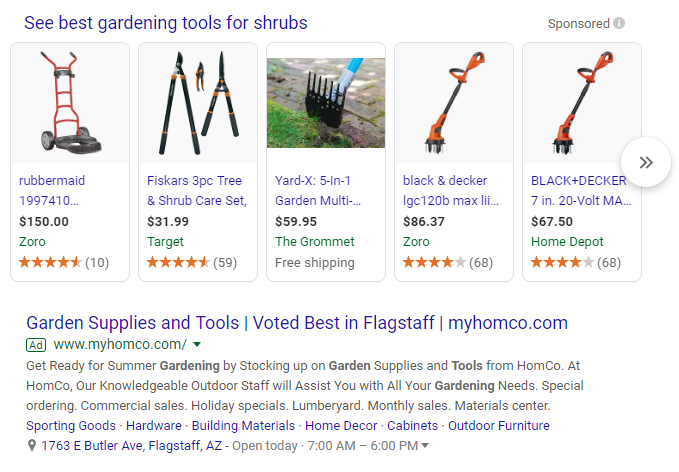
Alternative Traffic Generators
While much traffic on the web is generated through Google, the competition there can be fierce. That’s why most niche websites require additional website traffic-generating strategies.
Here are a few ways to drive more traffic to your website:
- Social media: Facebook, Twitter, Pinterest, LinkedIn, and Instagram are the most popular sites used by niche website owners for driving site traffic and sales. Each of these sites allows you to set up a free profile where you can engage potential customers. They all also offer paid ads where you can be more targeted in your reach and guarantee overall higher view rates.
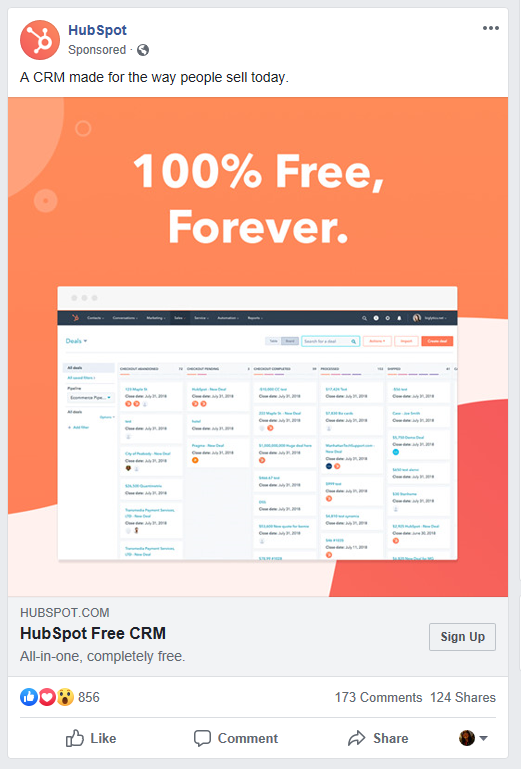
Example of a sponsored ad on Facebook.
- Email marketing: A popular marketing tactic for creating engaged followers is to develop free giveaways, also known as lead magnets, in exchange for a visitor signing up to receive your emails. To obtain emails from site visitors, you need to create a piece of downloadable content that your audience considers valuable. You give them high-value content, and they give you their email address. It’s a win-win. Building an email list is a great way to drive consistent return traffic to your site.
- Guest blogging: There are thousands of blogs that accept guest posts. You typically don’t get a fee for writing for someone else’s blog, but you can get great exposure in front of a big audience, which in turn drives traffic to your niche site.
- Podcasts: You can start your own podcast to promote your business and drive traffic to your website, or you can appear as a guest on a podcast that you don’t own.
Getting potential customers to your website will be one of your biggest challenges. Creating a diversified traffic generation strategy will help you attract the highly targeted site visitors you seek.
Niche Website Frequently Asked Questions (FAQs)
We want to make sure we answer your questions. Below are the questions we are asked most often about launching and managing a niche website. If you have additional questions for us, visit our forum and one of our experts will respond, usually within 24 hours.
Who is making money with niche websites?
Money-making websites exist in nearly every niche imaginable. A few profitable niche categories include pet sitting, financial planning, frugal living, mommy blogs, photography, home repair services, personal training and fitness, personal growth, life coaching, vacation planning, party planning, crafting, and hobbies.
Here’s a glimpse at a few niche websites that are earning impressive incomes.
- MoneySavingExpert.com: This website helps people make strong financial decisions. Launched in 2003, the site has more than 8 million monthly visitors.
- Show Me the Yummy: This site focuses on recipes and all things cooking-related. Their income reports tout that they earn more than $46,000 in monthly revenues, most of which is generated through affiliate marketing and advertising.
- LabradorTrainingHQ.com: As is evident by the domain name, this site focuses on how to train your Labrador. It’s estimated that this niche site earns in the ballpark of $18,000 to $21,000 per month.
These are just examples. Millions more niche sites generate money every single day.
How can I monetize my niche site fast?
If you don’t already have a digital or physical product developed, the fastest way to monetize a new website is through affiliate marketing. Join the networks that best align with your niche. Many companies offer affiliate programs that are not affiliated with networks, and it may pay to reach out to companies that you believe would be a good fit for an affiliate arrangement.
How do I avoid mistakes other niche sites make?
There are two big mistakes many new niche website owners make. The first is trying to do too much too soon. You can avoid this mistake by developing both a short- and long-term vision for your website and creating priorities based on what’s most important. The second mistake is spreading yourself too thin by focusing on too many traffic-driving channels. For best results, focus on one channel at a time and only move on when you have the time and energy to devote to the next strategy.
How much content do I need to launch?
A small handful of niche sites have launched and made money with a one-page site, but most require five to 20 pages of content on their site prior to launching. You can launch with five pages if you feel that is sufficient for your audience’s basic needs, and then expand your content over time.
Bottom Line
You want to build a niche website that looks great and monetizes quickly, preferably with as little investment as possible. If you follow the seven steps described throughout this article, you’ll be off to a great start to making money with your niche site.
If you want a jump-start to building your niche site, DreamHost can help you get started for $2.59 per month. DreamHost delivers all the features you need to create a money-making website that will serve you well for years to come. Visit DreamHost today.
Read More

0 تعليقات